Matcha Latte: the Ultimate Anti-Aging Drink
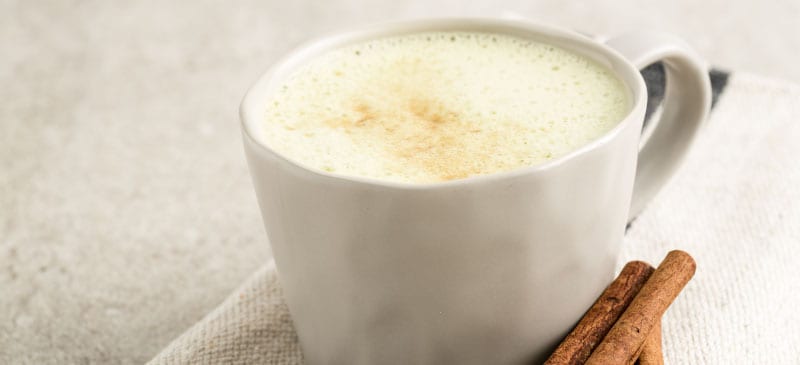
By now, you’ve probably heard about the power of matcha tea. Matcha is not your typical green tea — it’s a concentrated Japanese tea that works as an effective detoxifier, fat burner and health promoter.
That’s exactly why I drink this green tea latte made with antioxidant-rich matcha. And what makes this latte even more beneficial is the scoop of collagen protein. If you’re still asking yourself “what is collagen?,” then try this green tea latte and notice the benefits. Collagen protein improves the health of your skin, hair, bones, muscles, liver and heart. Not only is this green tea latte a delicious treat, it works to boost your energy levels and promote overall well-being, too!
The No. 1 Anti-Aging Drink
Green tea is the No. 1 anti-aging drink because it’s packed with flavonoid, polyphenol and catechin antioxidants. Drinking green tea regularly promotes better health and longevity because it works to reduce inflammation and oxidative stress that leads to so many health issues.
Research shows that the benefits of green tea include its ability to boost heart health by lowering blood pressure and cholesterol levels, prevent memory loss and brain cell damage, prevent insulin resistance, promote bone health and protect your vision.
Matcha is a concentrated form of green tea, so you’re getting all of the powerful nutrients in just one scoop of high-quality, ceremonial-grade matcha. Matcha is the best food source of catechin antioxidants, so adding a scoop to this green tea latte is a simple way to help prevent and relieve a number of major health concerns.
Nutrition Facts
One green tea latte made using this recipe contains roughly the following:
- 290 calories
- 3.9 grams carbohydrates
- 11.6 grams protein
- 32 grams fat
- 4.6 micrograms vitamin B12 (194 percent DV)
- 0.8 milligrams vitamin B2 (77 percent DV)
- 714 milligrams calcium (71 percent DV)
- 10 milligrams vitamin E (68 percent DV)
- 866 IUs vitamin A (37 percent DV)
- 2.7 milligrams zinc (34 percent DV)
- 0.49 milligrams manganese (28 percent DV)
- 0.24 milligrams copper (28 percent DV)
- 15 milligrams vitamin C (21 percent DV)
- 150 milligrams phosphorus (21 percent DV)
- 296 milligrams sodium (20 percent DV)
- 57 milligrams magnesium (18 percent DV)
- 0.12 milligrams thiamin (11 percent DV)
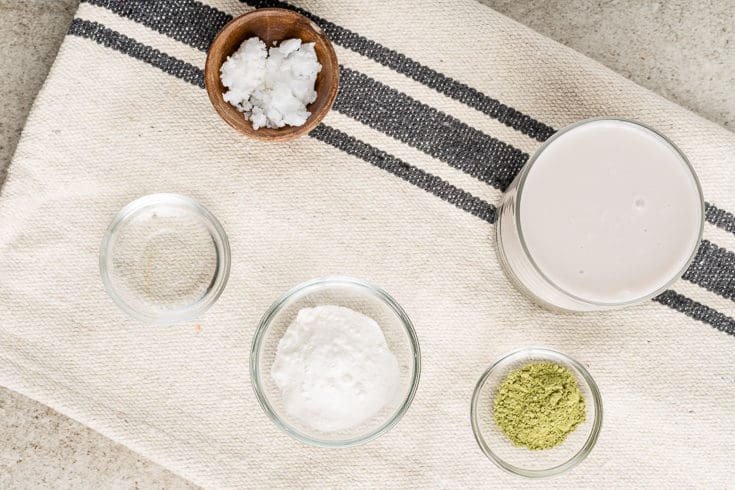
Along with matcha green tea, here’s a quick glance at some of the other top health benefits of the ingredients in this green tea latte:
- Coconut oil: Coconut oil benefits come from its medium-chain fatty acids that serve as a perfect source of energy, are easier to digest and aren’t stored as fat as quickly or as easily as other types of fats. Studies indicate that coconut oil can help to prevent heart disease, protect your liver, reduce inflammation and boost your immune system.
- Coconut butter: Coconut butter is ground-up coconut meat that has a buttery consistency. Coconut butter is about 60 percent oil, while coconut oil is 100 percent, so they are a little different. Unlike coconut oil, coconut butter contains fiber, which is important for controlling blood sugar levels and regulating digestion.
- Coconut milk: Coconut milk is free from dairy, lactose, nuts, grains and soy, so it’s the perfect choice for plant-based eaters. Plus, coconut milk nutrition includes manganese, magnesium, iron and potassium. Just like coconut oil, coconut milk helps to improve heart health, build muscle, prevent fatigue and boost weight loss.
- Collagen protein: Collagen is found in your muscles, skin, bones, blood vessels and digestive system. It reduces joint pain and degeneration, promotes the health of your skin, hair, nails and teeth, and improves the health of your liver and heart. Your body’s collagen production naturally slows down with age, so adding collagen protein to your smoothies or recipes like this green tea latte can help keep these bodily systems running properly.
This matcha latte is friendly for almond any diet, including keto, Paleo, vegan and more.
How to Make This Green Tea Latte
The first step to preparing this green tea latte is warming 1½ cups of either reduced fat coconut milk or unsweetened almond milk in a small pot or tea kettle.
Next, add the warm milk, coconut oil and coconut butter to a blender.
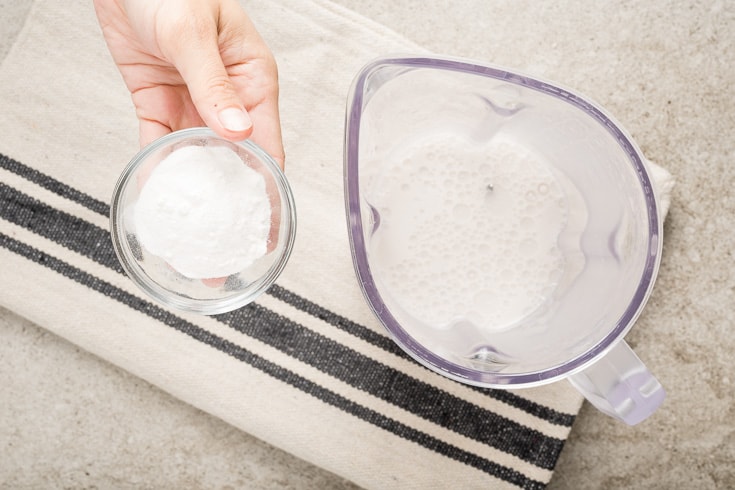
Then add in the ceremonial-grade matcha and 1 scoop of collagen protein. When choosing matcha at the grocery store or online, opt for an organic, GMO-free option. You also want the only ingredient on the label to be matcha — with no added sugars.
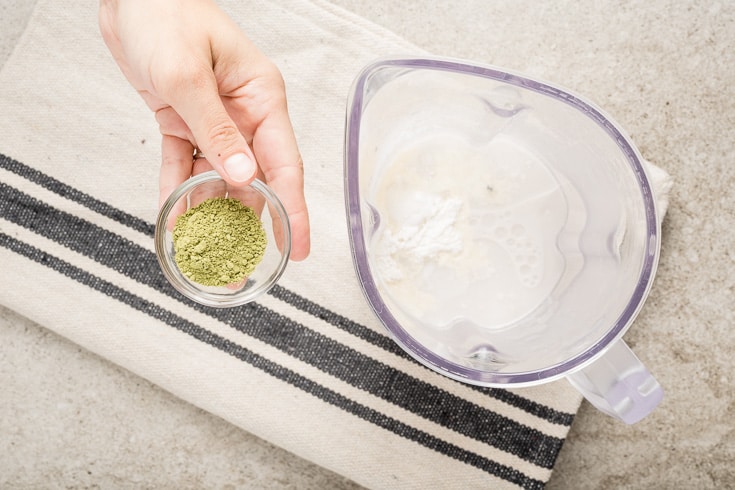
If you’d like to add a little sweetness to your latte, try using 1–2 teaspoons of maple syrup.
Now all of your ingredients are added and you’re ready to blend. Blend on high until your mixture is well-combined.
You’ll notice that the coconut or almond milk gets nice and frothy, and you won’t even notice that this latte is completely dairy-free. I like to top my latte with a little cinnamon, which adds to its antioxidant properties.
Enjoy your healthy green tea latte!
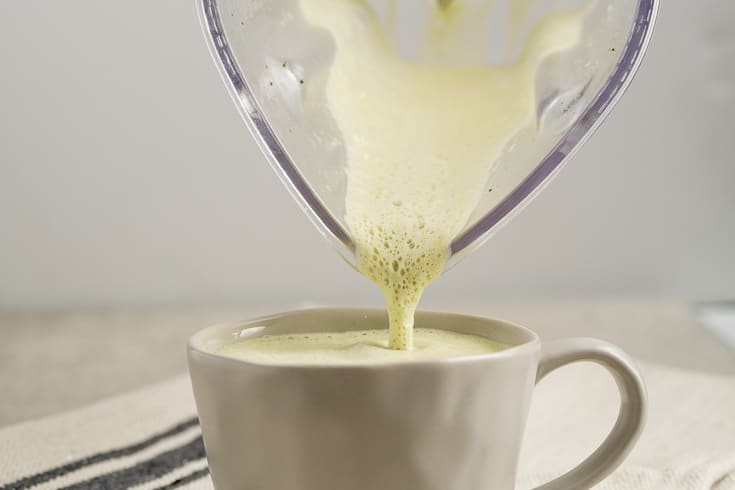 Print
Print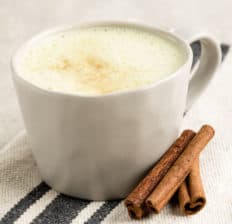
Matcha Green Tea Latte
- Total Time: 5 minutes
- Yield: 1 1x
- Diet: Vegan
Description
This green tea latte is made with antioxidant-rich matcha, healthy fats from coconut and a collagen protein for your skin and joints. It’ll become a regular in your morning rotation!
Ingredients
- 1½ cups coconut milk (reduced fat) or unsweetened almond milk
- 1 teaspoon ceremonial-grade matcha
- 1 scoop collagen powder
- 1 teaspoon coconut oil
- 2 teaspoons coconut butter
- 1–2 teaspoons maple syrup (optional)
Instructions
- In a tea kettle or small pot, warm the milk.
- In a blender, add the milk and all the other ingredients.
- Blend on high until well-combined.
- Top with cinnamon, serve and enjoy!
- Prep Time: 5 min
- Category: Beverages
- Method: Blender
- Cuisine: Japanese
Nutrition
- Serving Size: 12 ounces
- Calories: 290
- Sugar: 0g
- Sodium: 15mg
- Fat: 32g
- Saturated Fat: 28.3g
- Unsaturated Fat: 1.8g
- Trans Fat: 0g
- Carbohydrates: 3.9g
- Fiber: 0.2g
- Protein: 11.6g
- Cholesterol: 0mg
Comments
Please keep comments under 200 characters.


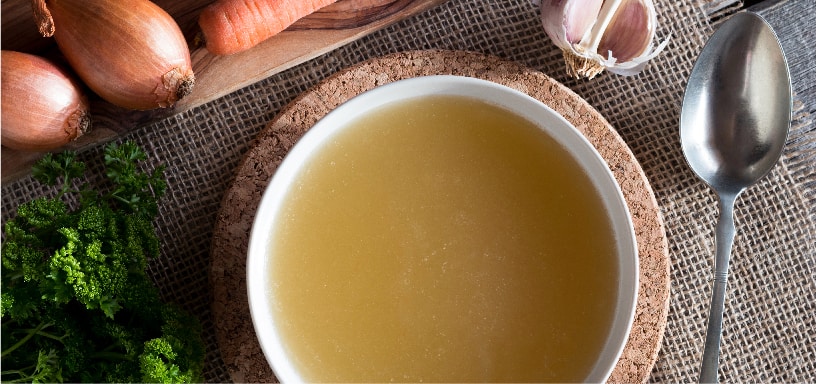
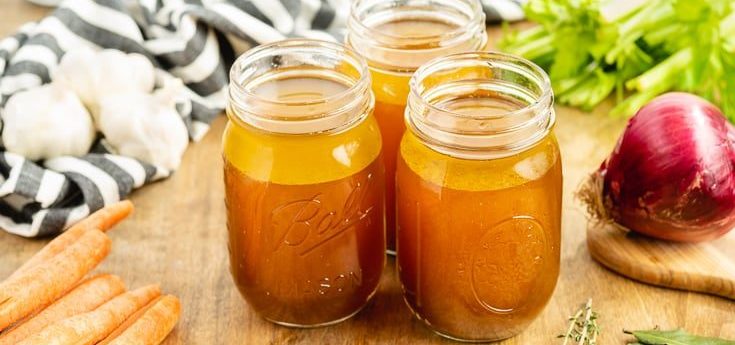
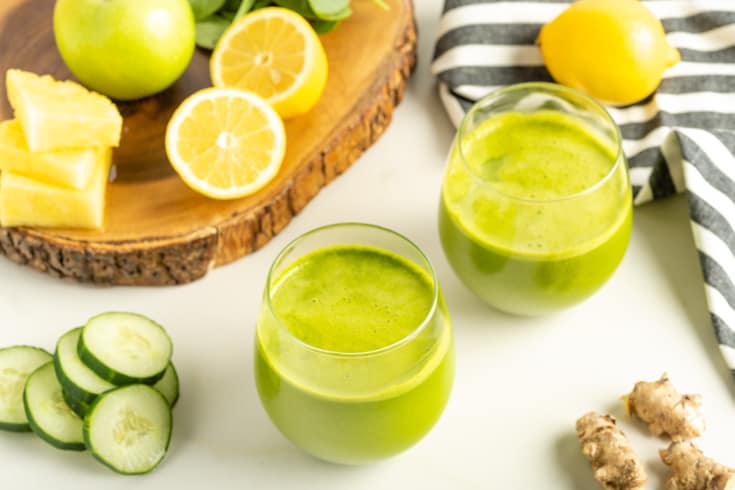

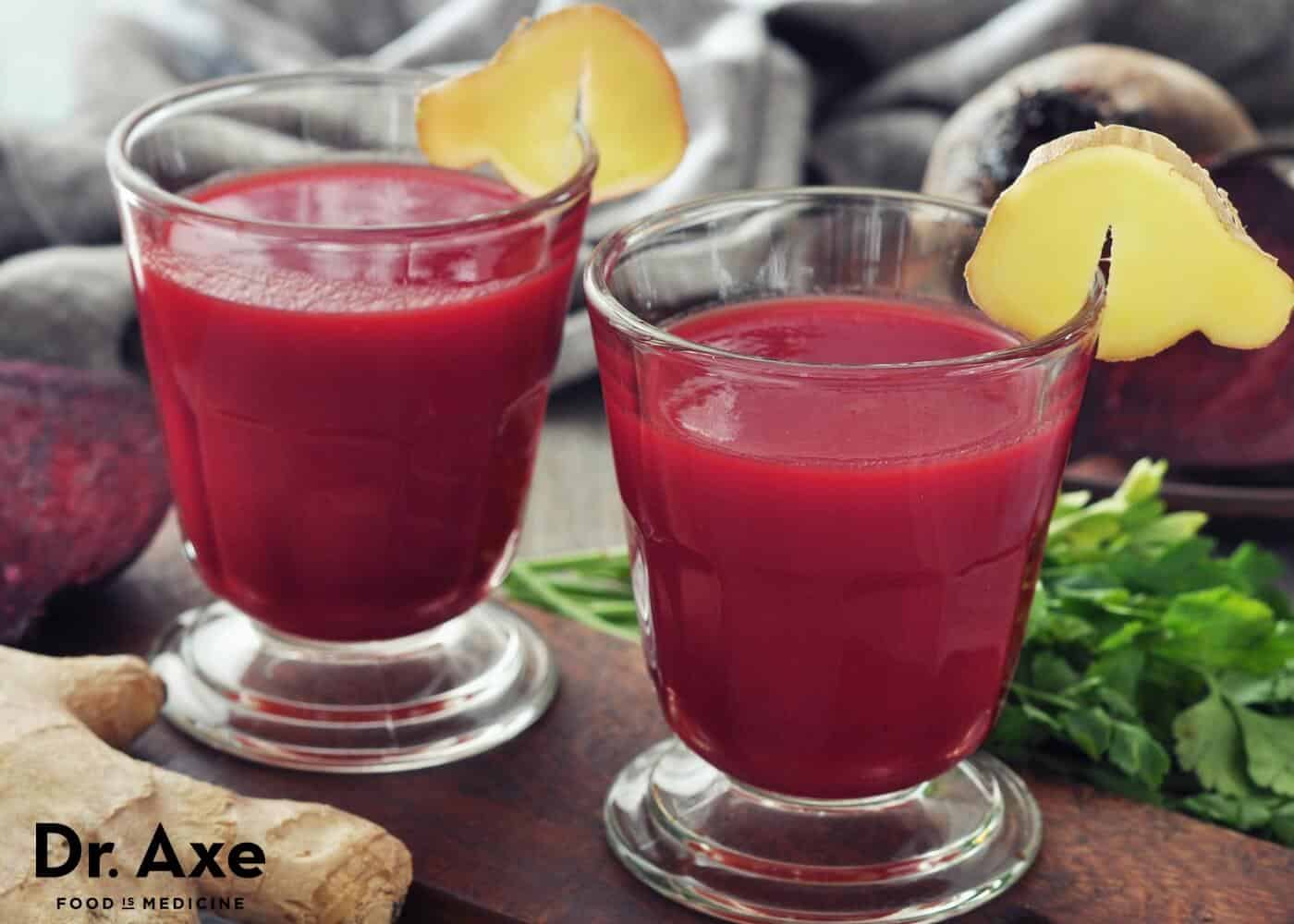
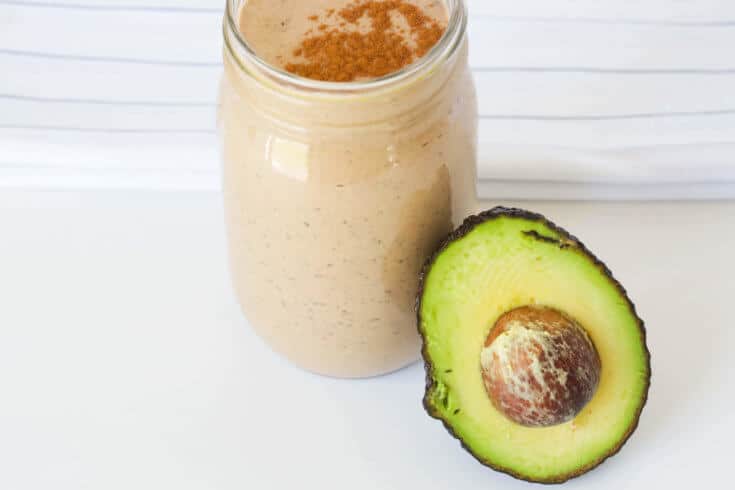


Excellent!
What if you have hypothyroid and you can’t handle caffeine? I also took a food sensitivity test that measured the antibodois how they are reacting to food. It show I had a reaction to coconut. Any sujestions.
Hi
I made this latte and it tasted great. But then I checked the calories in the Unsweetened Organic Coconut Milk I had used and it says 110 calories in 1/4 cup! That’s 660 just for the coconut milk!!
But the recipe said total calories in the Latte are 290. Did I use the wrong coconut milk?
You want to use reduced fat coconut milk.
How to order the Collagen protein powder?
Looks delish…how about the caffeine in matcha tea????
Does Matcha have caffeine or give you the jitters?
Hi Sheila, yes, matcha is a type of green tea, so it does contain caffeine. Most people will respond well to this form of caffeine, but each body is different.
In doing some research I discovered that green tea naturally absorbs lead from the soil. While the lead remains mostly in the hot water of brewed green tea, Matcha tea (which is ground green tea) releases all of the lead. Unless one can detect the amount of lead in a given source of Matcha tea it appears to be potentially hazardous to one’s health. It would be helpful if you clarified this matter on your website.
Thanks
I LOVE matcha! I drink it almost daily. My entire family got sick this winter, I firmly believe that matcha is the reason I did not get sick. Love the matcha packets you can add to your water bottles!
what if your a vegatarian or vegan,isthere another protein you can use besides the collagen powder.
oncern is any tea from china is bad it has been poluted over and over.
Is matcha green tea acidic?
Does this tea contain lead, and how much? Is it safe?
Dr. Axe:
I love checking out your recipes and most seem very appitizing but being diabetic, I’m reluctant to try them. The problem is the nutritional information is not listed. I would dearly love to see this information listed on your recipes, Please.
Hello, I’m not a big fan on products comming from dead animals. Is there any other options I could use instead of colagen? Thank you!
I appreciate learning from your teaching style. Sometimes you present a subject for which I need to know answers. Today I read the complete info about Epsom Salts, reminding me as to the value my parents taught me about oh so many years ago. I am 74, suffer from Dermatomyositis. Studying from you on Leaky Gut, and JJ Virgin’s diet I see value from the information I have learned that actually gives me relief from the pain I experience every day.
The Old Testiment tells us there is nothing new under the sun. As true as that is, I am grateful you uncover some of those truths for me. God bless you all.
Where are the answers to these questions?
Hello Kat, let me know if you have any questions.
Hi Dr Axe,
I am intolerant to all coconut products. What can I use in place of all the coconut?
Thanks
Jean
Hello Jean, Almond milk is a great substitute for coconut milk. For the coconut oil and butter, you can substitute both for your favorite nut butter or even ghee/grass-fed butter if you don’t mind the dairy.
A Good Morning was made even better after making this matcha tea latte. I used cashew butter because I didn’t have coconut butter. With cinnamon sprinkled on top it was yummy.
Sounds great Debbie, thanks for sharing.
The Matcha Green tea sounds really good, I will try it. Thanks
Great, feel free to let me know how you like it.
Thanks for your health, nutrition information, bless you, I have learnt so much. Again thankyou ?????
Appreciate you Jo. Glad you like the information.
What Brand of Matcha would you recommend pls
Hello there, I don’t have any brand recommendation but I suggest looking for “ceremonial grade matcha”. You may be able to find this at your local Whole Foods or supplement store.
Wow this looks wonderful! Thank you! Is it ok to use the matcha during pregnancy? Many thanks x
Hello There, Matcha contains a concentrated amount of caffeine. I recommend speaking with your physician to see if this is right for you during your pregnancy.
I would like to know to prepare Green Coffee from beans and what are the benefits
I roast mine just either using a popcorn popper or on my stove top. You can find many suggested ways and other machines to use online as well. I’m not sure of the health benefits, however I find it cheaper and after a little research I have learned that where your green beans were grown also makes a difference in flavor. Also roasting your own you can get different strengths and roast depending on the time and method used in roasting.
Hello There, We do not currently have any recipes on this but you may indeed enjoy this article: https://draxe.com/nutrition/green-coffee-bean/
Do you have a favorite brand of Macha you wouid recommend ?
Just after seeing this after I posted . I guess great minds think alike ?
Hello Julie, I don’t have any brand recommendation but I suggest looking for “ceremonial grade matcha”. You may be able to find this at your local Whole Foods or supplement store.
I love using organic ceremonial grade matcha from Kyoto Dew. I’ve tried allot of brands and this one is my favorite. https://www.amazon.com/Organic-Matcha-Green-Tea-Powder/dp/B01FE95IDU/ref=sr_1_1?ie=UTF8&qid=1504647893&sr=8-1-spons&keywords=kyoto+dew+matcha&psc=1
Dr. Axe,
I had been told adding milk to tea takes away all health benifits from the tea itself.
Is this not true?
Respectfully,
Rebecca Webre
Coconut and almond milk contain no dairy. He’s not talking about cows milk.
Hello Rebecca, Coconut milk has many great benefits. Here is a great article on some of the benefits: https://draxe.com/nutrition/coconut-milk-nutrition/ Adding to tea will only benefit the nutrient value.
Please advise on nutrition and vitamins etc for my 84 yr old mum who keeps getting anxiety attacks after her stay in hospital for 10 days .she now has been diagnosed with gastro pareses but she is constantly grinding her teeth and gets panic attacks in the evenings and starts crying because we do not understand what she is going throughsge is on maxillon for gastro eltroxin for thyroid and probiotics and something for the panic attacks
Please help
Thank you
Hello Amina, feel free to reach out to my team at [email protected] for any questions you may have.
Dear Dr Axe, Since the earthquake in Japan and the exposure to nuclear radiation, how is it safe to consume Matcha Tea? Isn’t any food grown there going to be contaminated?
When you say coconut milk…is that canned coconut milk?
You can use either canned or carton coconut milk for this recipe. Just make sure that there is no added sugar or thickeners like Carrageenan. Enjoy!
I don’t have any matcha, so instead I used ground up dried leaves from my moringa tree in place of the matcha. Moringa is also very nutritious.
Dear Dr Axe
Just wanted to thank you for all the good you are doing in sharing your nutritional tips with us you are very much appreciated
Thank you Florence. We appreciate you.